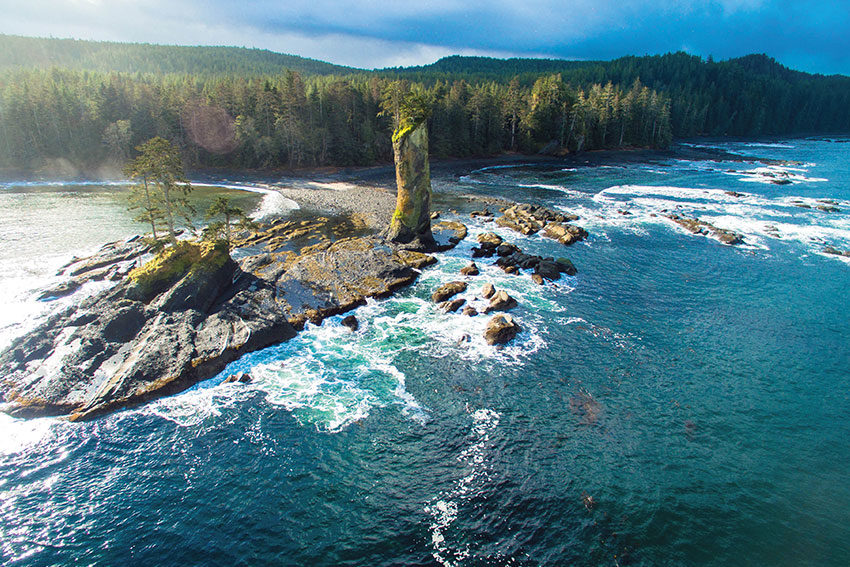Haida Gwaii, islands on the edge of the world

Ravens and eagles are a common sight in Haida Gwaii, the archipelago that lies 100 km off the northern coast of British Columbia.
Large black ravens strut with heads cocked and beady yellow eyes alert for any scraps of food, while bald eagles soar overhead, landing atop tall trees or diving to snatch a fish from the sea.
For the Haida, the First Nations people of these islands, ravens and eagles are significant figures in origin narratives and the crests of the moieties into which all Haida are born. Each moiety is sub-divided into family clans which also have crests referencing legendary ancestral and mythological figures whose exploits are told in Haida oral history. These include wolf, bear, beaver, hawk, sculpin, killer whale, mountain goat, and mythological creatures such as Bear Mother, Mouse Woman, Thunderbird and Sea Wolf. Crests were traditionally displayed on totem poles, house fronts, ceremonial clothing, jewellery, dance masks, storage boxes, and other items; but, for over a century, Canadian government assimilation policies banned Indian cultural practices and many cultural materials were confiscated, ending up in museum collections in North America and Europe.
In recent decades, however, the Haida have introduced language and cultural renewal programs, established Haida-owned businesses, renewed potlatching (gift-giving feasts), formed dance and drumming groups, and built the Haida Heritage Centre at Ḵay Llnagaay, Skidegate. Today, when attending ceremonies and other important events, many Haida wear jewellery, garments and woven spruce root hats adorned with clan crests. Members of Haida dance groups and graduating students wear traditional button blankets with crests outlined with mother-of-pearl buttons.
Clan crests feature prominently on totem poles, which are once again being raised. Visitors to Old Massett can take a self-guided tour of 17 poles raised in the village since 1969. Several poles can be seen in Skidegate, while in Queen Charlotte, a 13-metre pole was raised outside the new hospital in 2018, telling the story of traditional and modern medicine.

Head to the Haida Heritage Centre to learn about Haida culture and art. The five cedar buildings constructed in the traditional style of Haida longhouses, each has a carved frontal post. The Centre includes a welcome space, performing arts venue, café, canoe gallery, carving studio, Bill Reid Teaching Centre, and Haida Gwaii Museum with informative displays and a totem pole gallery.
In Gwaii Haanas National Park in the remote southern area of Haida Gwaii, there are several sites of old Haida villages abandoned in the late 19th century after introduced smallpox killed 90 per cent of the population. Access is by guided trip by boat or seaplane with a licensed tour operator. The most significant is World Heritage listed where some carved mortuary poles still stand; others, removed in 1957, are in the Royal British Columbia Museum, Victoria and the University of British Columbia’s Museum of Anthropology, Vancouver.
Haida Gwaii accommodation includes guesthouses, hotels, self-catering rentals, fishing lodges, and campsites, often booked out many months ahead. In Charlotte City, many overlook Skidegate Inlet providing dramatic views in ever-changing light – you will see why Haida Gwaii is sometimes called ‘Misty Islands’. Haida House at Tllaal, owned and operated by the Haida Nation, offers fully inclusive holiday packages with cultural experiences. There are several small guesthouses in Massett and Old Massett, some with waterfront views. Along the road to Tow Hill, secluded beachside accommodation is available at Alaska View Lodge. Rustic cabins are available within Naikoon Park at Hiellen Longhouse Village, owned and operated by the Old Massett Band.
Most dining in Haida Gwaii is casual, but there are a few standouts. Charters restaurant in Masset has an excellent reputation. Alaska View Lodge offers guests delicious set three-course dinners and serves non-residents if space at the dining-table allows – it’s worth a phone call as meals are excellent and well-priced. Likewise, Haida House has a restaurant with à la carte menu and may take other diners. In Charlotte City, Dining with the Knights and Keewani’s Kitchen offer in-home dining experiences, the latter serving traditional Haida foods.
Arts and crafts, T-shirts, books on natural history and Haida culture are sold at the Haida Heritage Center, Sarah’s Art and Craft Store in Old Massett, and Crystal Cabin in Tlell. Artist April White sells watercolours and prints in her studio and gallery in Massett while Ben Davidson, son of Robert Davidson – one of the most prominent contemporary Haida artists – has opened a studio and fine art gallery in Skidegate selling his own sculptures and prints, as well as works by other Haida artists. Silver, gold and argillite jewellery, silk screen and giclee prints, and clothing depicting clan crests provide beautiful and easy to pack mementos of a visit to Haida Gwaii.
Header image:
Shutterstock